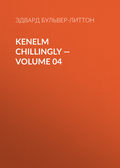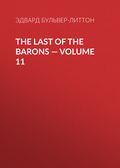
Эдвард Бульвер-Литтон
Paul Clifford — Complete
In a certain town of that Great Country where shoes are imperfectly polished—[See Captain Hall’s late work on America]—and opinions are not prosecuted, there resided, twenty years after the date of Lucy Brandon’s departure from England, a man held in high and universal respect, not only for the rectitude of his conduct, but for the energies of his mind, and the purposes to which they were directed. If you asked who cultivated that waste, the answer was, “Clifford!” who procured the establishment of that hospital, “Clifford!” who obtained the redress of such a public grievance, “Clifford!” who struggled for and won such a popular benefit, “Clifford!” In the gentler part of his projects and his undertakings—in that part, above all, which concerned the sick or the necessitous—this useful citizen was seconded, or rather excelled, by a being over whose surpassing loveliness Time seemed to have flown with a gentle and charming wing. There was something remarkable and touching in the love which this couple (for the woman we refer to was Clifford’s wife) bore to each other; like the plant on the plains of Hebron, the time which brought to that love an additional strength brought to it also a softer and a fresher verdure. Although their present neighbours were unacquainted with the events of their earlier life previous to their settlement at —————, it was known that they had been wealthy at the time they first came to reside there, and that, by a series of fatalities, they had lost all. But Clifford had borne up manfully against fortune; and in a new country, where men who prefer labour to dependence cannot easily starve, he had been enabled to toil upward through the severe stages of poverty and hardship with an honesty and vigour of character which won him, perhaps, a more hearty esteem for every successive effort than the display of his lost riches might ever have acquired him. His labours and his abilities obtained gradual but sure success; and he now enjoyed the blessings of a competence earned with the most scrupulous integrity, and spent with the most kindly benevolence. A trace of the trials they had passed through was discernible in each; those trials had stolen the rose from the wife’s cheek, and had sown untimely wrinkles in the broad brow of Clifford. There were moments, too, but they were only moments, when the latter sank from his wonted elastic and healthful cheerfulness of mind into a gloomy and abstracted revery; but these moments the wife watched with a jealous and fond anxiety, and one sound of her sweet voice had the power to dispel their influence; and when Clifford raised his eyes, and glanced from her tender smile around his happy home and his growing children, or beheld through the very windows of his room the public benefits he had created, something of pride and gladness glowed on his countenance, and he said, though with glistening eyes and subdued voice, as his looks returned once more to his wife, “I owe these to thee!”
One trait of mind especially characterized Clifford,—indulgence to the faults of others. “Circumstances make guilt,” he was wont to say; “let us endeavour to correct the circumstances, before we rail against the guilt!” His children promised to tread in the same useful and honourable path that he trod himself. Happy was considered that family which had the hope to ally itself with his.
Such was the after-fate of Clifford and Lucy. Who will condemn us for preferring the moral of that fate to the moral which is extorted from the gibbet and the hulks,—which makes scarecrows, not beacons; terrifies our weakness, not warms our reason. Who does not allow that it is better to repair than to perish,—better, too, to atone as the citizen than to repent as the hermit? Oh, John Wilkes, Alderman of London, and Drawcansir of Liberty, your life was not an iota too perfect,—your patriotism might have been infinitely purer, your morals would have admitted indefinite amendment, you are no great favourite with us or with the rest of the world,—but you said one excellent thing, for which we look on you with benevolence, nay, almost with respect. We scarcely know whether to smile at its wit or to sigh at its wisdom. Mark this truth, all ye gentlemen of England who would make law as the Romans made fasces,—a bundle of rods with an axe in the middle,—mark it, and remember! long may it live, allied with hope in ourselves, but with gratitude in our children,—long after the book which it now “adorns” and “points” has gone to its dusty slumber,—long, long after the feverish hand which now writes it down can defend or enforce it no more: “THE VERY WORST USE TO WHICH YOU CAN PUT A MAN IS TO HANG HIM!”
NOTE
In the second edition of this novel there were here inserted two “characters” of “Fighting Attie” and “Gentleman George,” omitted in the subsequent edition published by Mr. Bentley in the “Standard Novels.” At the request of some admirers of those eminent personages, who considered the biographical sketches referred to impartial in themselves, and contributing to the completeness of the design for which men so illustrious were introduced, they are here retained, though in the more honourable form of a separate and supplementary notice.
FIGHTING ATTIE
When he dies, the road will have lost a great man, whose foot was rarely out of his stirrup, and whose clear head guided a bold hand. He carried common-sense to its perfection, and he made the straight path the sublimest. His words were few, his actions were many. He was the Spartan of Tobymen, and laconism was the short soul of his professional legislation!
Whatever way you view him, you see those properties of mind which command fortune; few thoughts not confusing each other,—simple elements, and bold. His character in action maybe summed in two phrases,—“a fact seized, and a stroke made.” Had his intellect been more luxurious, his resolution might have been less hardy; and his hardiness made his greatness. He was one of those who shine but in action,—chimneys (to adapt the simile of Sir Thomas More) that seem useless till you light your fire. So in calm moments you dreamed not of his utility, and only on the road you were struck dumb with the outbreaking of his genius. Whatever situation he was called to, you found in hire what you looked for in vain in others; for his strong sense gave to Attie what long experience ought, but often fails, to give to its possessors. His energy triumphed over the sense of novel circumstance, and he broke in a moment through the cobwebs which entangled lesser natures for years. His eye saw a final result, and disregarded the detail. He robbed his man without chicanery; and took his purse by applying for it rather than scheming. If his enemies wish to detract from his merit,—a merit great, dazzling, and yet solid,—they may, perhaps, say that his genius fitted him better to continue exploits than to devise them; and thus that, besides the renown which he may justly claim, he often wholly engrossed that fame which should have been shared by others: he took up the enterprise where it ceased at Labour, and carried it onwards, where it was rewarded with Glory. Even this charge proves a new merit of address, and lessens not the merit less complicated the have allowed him before. The fame he has acquired may excite our emulation; the envy he has not appeased may console us for obscurity.
A stanza of Greek poetry—Thus, not too vigorously, translated by Mr. West,—
“But wrapped in error is the human mind, And human bliss is ever insecure—Know we what fortune shall remain behind? Know we how long the present shall endure?”
GENTLEMAN GEORGE
For thee, Gentleman George, for thee, what conclusive valediction remains? Alas! since we began the strange and mumming scene wherein first thou went introduced, the grim foe hath knocked thrice at thy gates; and now, as we write,—[In 1830]—thou art departed thence,—thou art no more! A new lord presides to thine easy-chair, a new voice rings from thy merry board,—thou art forgotten! thou art already, like these pages, a tale that is told to a memory that retaineth not! Where are thy quips and cranks; where thy stately coxcombries and thy regal gauds? Thine house and thy pagoda, thy Gothic chimney and thy Chinese sign-post,—these yet ask the concluding hand. Thy hand is cold; their completion, and the enjoyment the completion yields, are for another! Thou sowest, and thy follower reaps; thou buildest, thy successor holds; thou plantest, and thine heir sits beneath the shadow of thy trees,—
“Neque harum, quas colis, arborum
Te, praeter invisas cupressos,
Ulla brevem dominum sequetur!”
[“Nor will any of these trees thou didst cultivate follow thee, the shortlived lord, save the hateful Cyprus.”]
At this moment thy life,—for thou veert a Great Man to thine order, and they have added thy biography to that of Abershaw and Sheppard,—thy life is before us. What a homily in its events! Gayly didst thou laugh into thy youth, and run through the courses of thy manhood. Wit sat at thy table, and Genius was thy comrade. Beauty was thy handmaid; and Frivolity played around thee,—a buffoon that thou didst ridicule, and ridiculing enjoy! Who among us can look back to thy brilliant era, and not sigh to think that the wonderful men who surrounded thee, and amidst whom thou wert a centre and a nucleus, are for him but the things of history, and the phantoms of a bodiless tradition? Those brilliant. suppers, glittering with beauty, the memory of which makes one spot (yet inherited by Bachelor Bill) a haunted and a fairy ground; all who gathered to that Armida’s circle,—the Grammonts and the Beauvilliers and the Rochefoucaulds of England and the Road,—who does not feel that to have seen these, though but as Gil Blas saw the festivities of his actors, from the sideboard and behind the chair, would have been a triumph for the earthlier feelings of his old age to recall? What, then, must it have been to have seen them as thou didst see,—thou, the deceased and the forgotten!—-seen them from the height of thy youth and power and rank (for early wert thou keeper to a public), and reckless spirits, and lusty capacities of joy? What pleasures where sense lavished its uncounted varieties? What revellings where wine was the least excitement?
Let the scene shift. How stirring is the change! Triumph and glitter and conquest! For thy public was a public of renown; thither came the Warriors of the Ring,—the Heroes of the Cross,—and thou, their patron, wert elevated on their fame! “Principes pro victoria pugnant, comites pro Principe.”—[Chiefs for the victory fight,—for chiefs the soldiers]—What visions sweep across us! What glories didst thou witness! Over what conquests didst thou preside! The mightiest epoch, the most wonderful events which the world, thy world, ever knew,—of these was it not indeed, and dazzlingly thine,—
“To share the triumph and partake the gale”?
Let the scene shift. Manhood is touched by age; but Lust is “heeled” by Luxury, and Pomp is the heir of Pleasure; gewgaws and gaud, instead of glory, surround, rejoice, and flatter thee to the last. There rise thy buildings; there lie, secret but gorgeous, the tabernacles of thine ease; and the earnings of thy friends, and the riches of the people whom they plunder, are waters to thine imperial whirlpool. Thou art lapped in ease, as is a silkworm; and profusion flows from thy high and unseen asylum as the rain poureth from a cloud.—Much didst thou do to beautify chimney-tops, much to adorn the snuggeries where thou didst dwell. Thieving with thee took a substantial shape; and the robberies Of the public passed into a metempsychosis of mortar, and became public-houses. So there and thus, building and planning, didst thou spin out thy latter yarn, till Death came upon thee; and when we looked around, lo! thy brother was on thy hearth. And thy parasites and thy comrades and thine ancient pals and thy portly blowens, they made a murmur, and they packed up their goods; but they turned ere they departed, and they would have worshipped thy brother as they worshipped thee,—but he would not! And thy sign-post is gone and mouldered already; and to the Jolly Angler has succeeded the Jolly Tar! And thy picture is disappearing fast from the print-shops, and thy name from the mouths of men! And thy brother, whom no one praised while thou didst live, is on a steeple of panegyric built above the churchyard that contains thy grave. O shifting and volatile hearts of men! Who would be keeper of a public? Who dispense the wine and the juices that gladden, when the moment the pulse of the band ceases, the wine and the juices are forgotten?
To History,—for thy name will be preserved in that record which, whether it be the calendar of Newgate or of nations, telleth its alike how men suffer and sin and perish,—to History we leave the sum and balance of thy merits and thy faults. The sins that were thine were those of the man to whom pleasure is all in all: thou wert, from root to branch, sap and in heart, what moralists term the libertine; hence the light wooing, the quick desertion, the broken faith, the organized perfidy, that manifested thy bearing to those gentler creatures who called thee ‘Gentleman George.’ Never to one solitary woman, until the last dull flame of thy dotage, didst thou so behave as to give no foundation to complaint and no voice to wrong. But who shall say be honest to one, but laugh at perfidy to another? Who shall wholly confine treachery to one sex, if to that sex he hold treachery no offence? So in thee, as in all thy tribe, there was a laxness of principle, an insincerity of faith, even unto men: thy friends, when occasion suited, thou couldst forsake; and thy luxuries were dearer to thee than justice to those who supplied them. Men who love and live for pleasure as thou, are usually good-natured; for their devotion to pleasure arises from the strength of their constitution, and the strength of their constitution preserves them from the irritations of weaker nerves. So went thou good-natured and often generous; and often with thy generosity didst thou unite a delicacy that showed thou hadst an original and a tender sympathy with men. But as those who pursue pleasure are above all others impatient of interruption, so to such as interfered with thy main pursuit thou didst testify a deep, a lasting, and a revengeful anger. Yet let not such vices of temperament be too severely judged! For to thee were given man’s two most persuasive tempters, physical and moral,—Health and Power! Thy talents, such as they were,—and they were the talents of a man of the world,—misled rather than guided thee, for they gave thy mind that demi-philosophy, that indifference to exalted motives, which is generally found in a clever rake. Thy education was wretched; thou hadst a smattering of Horace, but thou couldst not write English, and thy letters betray that thou went wofully ignorant of logic. The fineness of thy taste has been exaggerated; thou wert unacquainted with the nobleness of simplicity; thy idea of a whole was grotesque and overloaded, and thy fancy in details was gaudy and meretricious. But thou hadst thy hand constantly in the public purse, and thou hadst plans and advisers forever before thee; more than all, thou didst find the houses in that neighbourbood wherein thou didst build, so preternaturally hideous that thou didst require but little science to be less frightful in thy creations. If thou didst not improve thy native village and thy various homes with a solid, a lofty, and a noble taste, thou didst nevertheless very singularly improve. And thy posterity, in avoiding the faults of thy masonry, will be grateful for the effects of thy ambition. The same demi-philosophy which influenced thee in private life exercised a far benigner and happier power over thee in public. Thou wert not idly vexatious in vestries, nor ordinarily tyrannic in thy parish; if thou wert ever arbitrary it was only when thy pleasure was checked, or thy vanity wounded. At other times thou didst leave events to their legitimate course, so that in thy latter years thou wert justly popular in thy parish; and in the grave thy great good fortune will outshine thy few bad qualities, and men will say of thee with a kindly, not an erring judgment, “In private life he was not worse than the Rufers who came to this bar; in public life he was better than those who kept a public before him.” Hark! those huzzas! what is the burden of that chorus? Oh, grateful and never time-serving Britons, have ye modified already for another the song ye made so solely in honour of Gentleman George: and must we, lest we lose the custom of the public and the good things of the tap-room,—roust we roar with throats yet hoarse with our fervour for the old words, our ardour for the new—
“Here’s to Mariner Bill, God bless him!
God bless him!
God bless him!
Here ‘s to Mariner Bill, God bless him!”
TOMLINSONIANA;
OR,
THE POSTHUMOUS WRITINGS OF THE CELEBRATED AUGUSTUS TOMLINSON, PROFESSOR OF MORAL PHILOSOPHY IN THE UNIVERSITY OF ———- ADDRESSED TO HIS PUPILS, AND COMPRISING
INTRODUCTION
Having lately been travelling in Germany, I spent some time at that University in which Augustus Tomlinson presided as Professor of Moral Philosophy. I found that that great man died, after a lingering illness, in the beginning of the year 1822, perfectly resigned to his fate, and conversing, even on his deathbed, on the divine mysteries of Ethical Philosophy. Notwithstanding the little peccadilloes to which I have alluded in the latter pages of “Paul Clifford,” and which his pupils deemed it advisable to hide from—
“The gaudy, babbling, and remorseless day,”
his memory was still held in a tender veneration. Perhaps, as in the case of the illustrious Burns, the faults of a great man endear to you his genius. In his latter days the PROFESSOR was accustomed to wear a light-green silk dressing-gown, and, as he was perfectly bald, a little black velvet cap; his small-clothes were pepper and salt. These interesting facts I learned from one of his pupils. His old age was consumed in lectures, in conversation, and in the composition of the little morceaux of wisdom we present to the public. In these essays and maxims, short as they are, he seems to have concentrated the wisdom of his industrious and honourable life. With great difficulty I procured from his executors the manuscripts which were then preparing for the German press. A valuable consideration induced those gentlemen to become philanthropic, and to consider the inestimable blessings they would confer upon this country by suffering me to give the following essays to the light, in their native and English dress, on the same day whereon they appear in Germany in the graces of foreign disguise.
At an age when, while Hypocrisy stalks, simpers, sidles, struts, and hobbles through the country, Truth also begins to watch her adversary in every movement, I cannot but think these lessons of Augustus Tomlinson peculiarly well-timed. I add them as a fitting Appendix to a Novel that may not inappropriately be termed a Treatise on Social Frauds; and if they contain within them that evidence of diligent attention and that principle of good in which the satire of Vice is only the germ of its detection, they may not, perchance, pass wholly unnoticed; nor be even condemned to that hasty reading in which the Indifference of to-day is but the prelude to the Forgetfulness of to-morrow.







